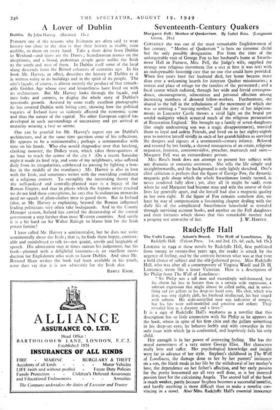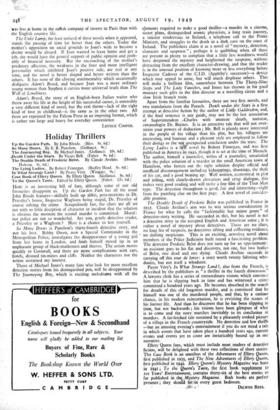Radclyffe Hall
The Unlit Lamp. Adam's Breed. The Well of Loneliness. B Radclytie Hall. (Falcon Press. 1st. and 2nd. 12s. 6d. each, 3rd. 15s.
LOOKING in 1949 at these novels by Radclyffe Hall, first published from twenty to twenty-five years ago, the reader is struck by the urgency of feeling, and by the contrast between what was at that time a bold choice of subject and the oldiashioned prose. Miss Radclyffe Hall, who was after all a contemporary of Virginia Woolf and D. H. Lawrence, wrote like a lesser Victorian. Here is a description of Sir Philip from The Well of Loneliness: " Sir Philip was a tall man and exceedingly well-favoured, but his charm lay less in feature than in a certain wide expression, a
tolerant expression that might almost be called noble, and in some- thing sad yet gallant in his deep-set hazel eyes. His chin, which was firm, was very slightly cleft, his forehead intellectual, his hair tinged with auburn. His wide-nostrilled nose was indicative of temper, but his lips were well-modelled and sensitive and ardent: They revealed him as a dreamer and a lover."
It is a sign of Radclyffe Hall's weakness as a novelist . that this description has so little connection with Sir Philip as he appears in the book, where in spite of his firm chin and the gallant something in his deep-set eyes, he behaves feebly and with cowardice in the only issue with which he is confronted, and hopelessly fails hiti only child.
Her strength is in her power of conveying feeling. She has the moral earnestness of a very minor George Eliot. Her characters really love and suffer. Her psychological knowledge and insight were far in advance of her style. Stephen's childhood in The Well of Loneliness, the damage done to her by her parents' insistence on a son, the blank made in her life by the withdrawal of her mother's love, the dependence on her father's affection, and her early passion for ;he pretty housemaid are all very well done, as is her inverted passion later for the calculating Angela. The second half of the book is much weaker, partly,becausc Stephen becomes a successfurneVelist, and hardly anything is more difficult than to make a novelist con- vincing in a novel. Also Miss Radclyffe Hall's essential innocence
was less at home in the raffish company of inverts in Paris than with the English country life.
The Unlit Lamp, the least noticed of these novels when it appeared, stands the passing of time far better than the others. Today the mother's opposition on social grounds to Joan's wish to become a doctor would be absurd. If Joan wanted to leave home and get a job, she would have the general support of public opinion and prob- ably of financial necessity. But the encroaching of the mother's predatory affection, the weakness in the finer and more intelligent personality which inhibited Joan's positive side, are real at any time, and the novel is better shaped and better written than the others. It has none of the cloying sentimentality which occasionally disfigures Adam's Breed, and because Joan was a more ordinary young woman than Stephen it carries more universal truth than The Well of Loneliness.
Adam's Breed, the story of an English-born Italian waiter who threw away his life at the height of his successful career, is ostensibly a very different kind of novel, but the real theme—lack of the right kind of love in childhood—is the same as in the other two. All three are reprinted by the Falcon Press in an imposing format, which is rather too large and heavy for everyday convenience.
LETTICE COOPER.



































 Previous page
Previous page